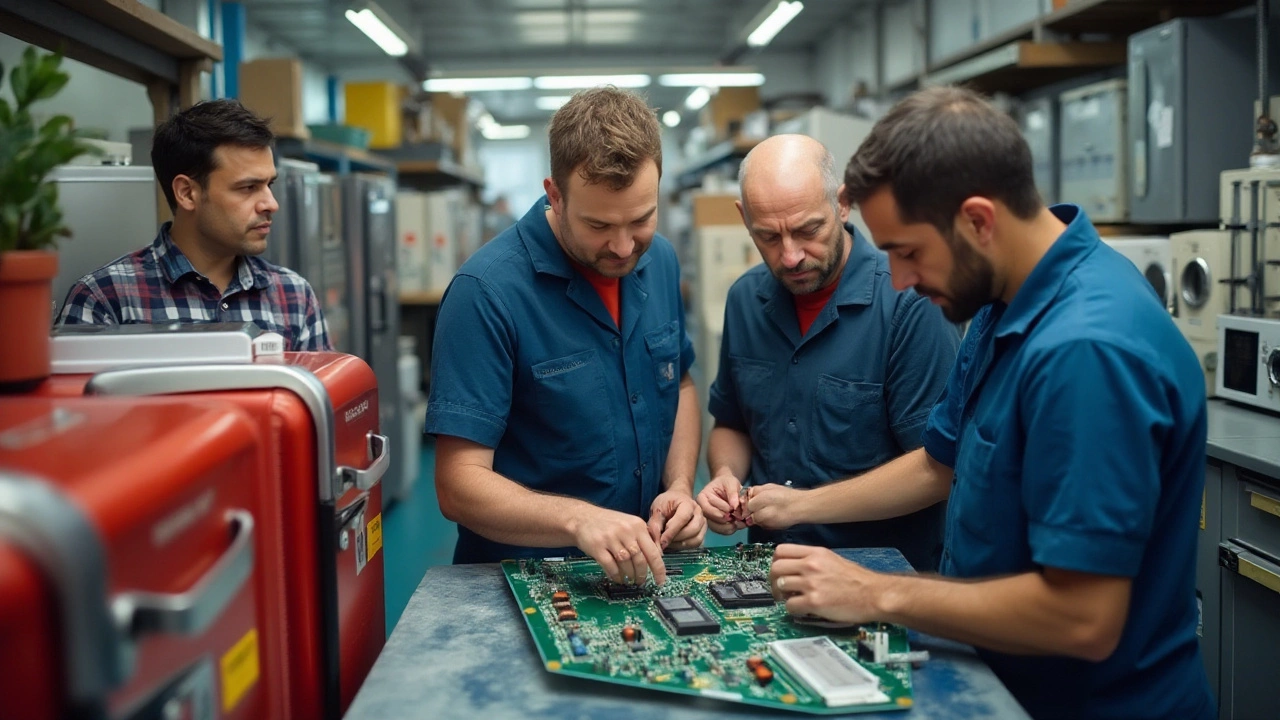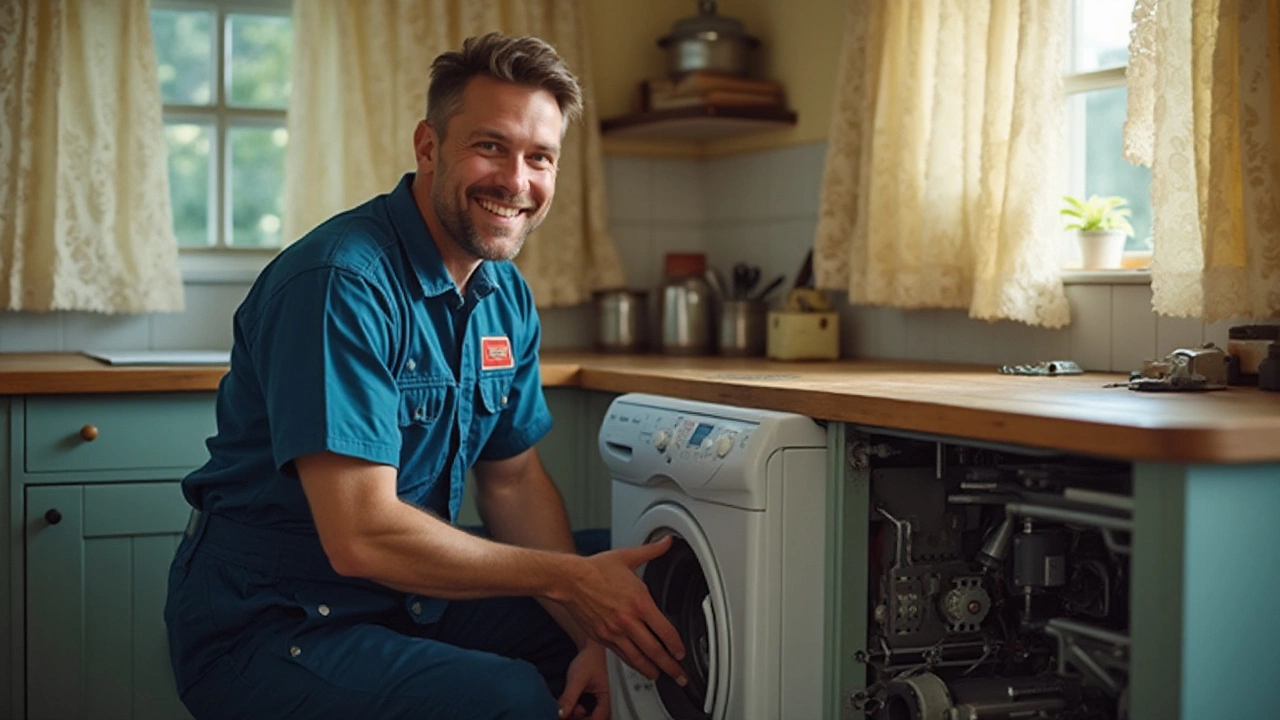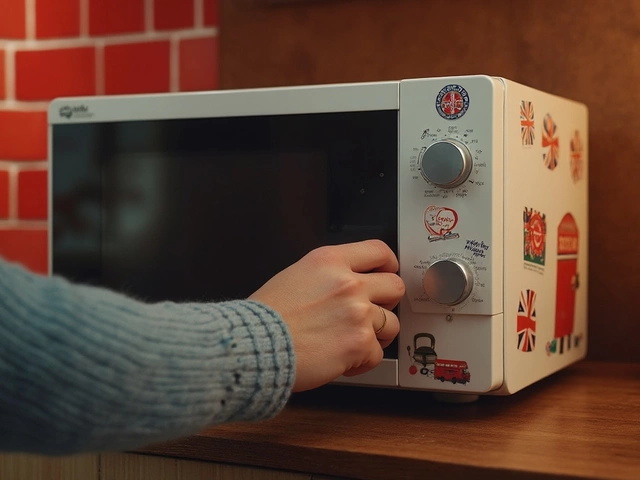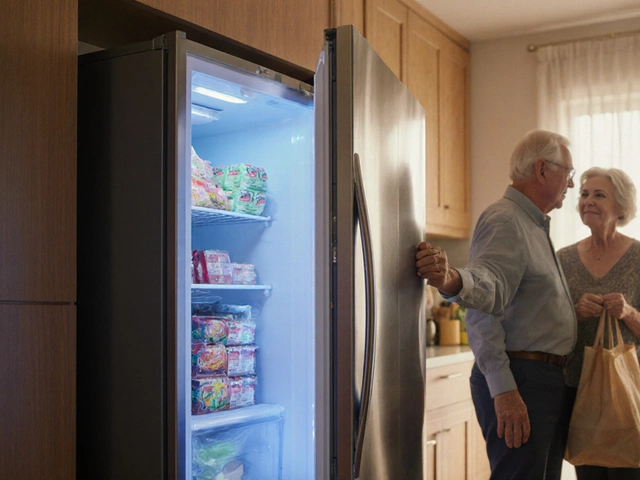An appliance job isn't just about fixing what's broken. It's about understanding the intricate world of everything that makes our homes run efficiently. If you've ever had your fridge give you trouble or your oven go on strike right before a big dinner, you've witnessed firsthand the value of a good appliance service technician. These unsung heroes play a critical role in ensuring our households continue to function without a hitch.
In this article, we'll explore what an appliance job truly encompasses, from the core responsibilities that come with it to the skills that make someone excel in this field. Whether you're curious about how the profession works or considering diving into it yourself, knowing what to expect can make all the difference. After all, appliances may seem mundane, but they hold a significant place in our everyday lives.
- Defining an Appliance Job
- Core Responsibilities
- Essential Skills and Training
- Tools of the Trade
- Common Challenges Faced
- Tips for Success
Defining an Appliance Job
When we talk about an appliance service job, it's important to realize we're not just referring to someone simply fixing a broken toaster. An appliance job encompasses a wide range of tasks and responsibilities that require a deep understanding of various machines and devices we rely on every day. From refrigerators maintaining our food's freshness to washing machines that spare us from manual labor, these unsung heroes of the household quietly make life more convenient. The primary role of an appliance technician is to ensure that these devices are running smoothly and efficiently, which involves diagnosing problems, conducting repairs, and maintaining them to prevent future issues.
An appliance service technician needs to wear many hats. These professionals often juggle tasks such as identifying faults, repairing parts, and even offering advice on appliance care to prevent breakdowns. They deal with both electrical and mechanical components, demanding a solid understanding of how different systems work. Indeed, this is not just about tightening a screw or replacing a worn-out belt. Instead, it’s about understanding the nuances of appliance design, keeping up with the latest technological advances, and having that intuitive knack for pinpointing issues that sometimes baffle users.
Interestingly, appliance repair has been a significant part of our economy for many years. According to the U.S. Bureau of Labor Statistics, the employment of home appliance repairers is expected to experience slow growth, reflecting the durable nature of modern appliances and the increasing complexity of new technologies. These changing dynamics require technicians to frequently update their skills, often through continuing education courses and hands-on training. James Gibson, a veteran in appliance repair, once remarked, "Staying ahead means embracing every change technology throws your way; it's not just about nuts and bolts anymore."
The role of a technician doesn't stop at repairs. Regular maintenance is a crucial aspect of their job to extend the life of appliances and enhance performance, which is highly beneficial for customers who wish to save on costly future repairs. This involves cleaning, adjusting parts, lubricating components, and sometimes upgrading software in smart appliances. An effective maintenance routine can significantly improve an appliance's longevity, efficiency, and safety, making the technician’s role indispensable.
Additionally, customer service is a quintessential part of any appliance job. Technicians must communicate effectively with clients, discussing issues in comprehensible terms and offering solutions that align with customer needs and concerns. In today's competitive business environment, technicians who double as knowledgeable advisors, building trust through honest and forthright interactions, often enjoy repeat business. Wearing a badge that says "appliance repair expert" doesn’t just certify technical skills; it also acknowledges one's ability to provide exceptional service.
Moreover, appliance jobs typically involve some level of specialization. Some technicians focus on particular types of equipment, such as kitchen appliances, HVAC systems, or laundry machines. This allows them to hone their expertise in specific areas, optimize their repair skills, and stay ahead of the technological curve. Whether it’s the adaptability needed to handle software in modern-day washing machines or the precision required to tweak an HVAC unit, specialization often defines the career trajectory within appliance service fields.
The world of appliance service might appear straightforward on the surface, but it’s a fascinating blend of technology, skill, and human interaction. Those pursuing a career in this field find themselves equipped with knowledge applicable in various domains, from household maintenance to industrial applications, making it a truly versatile profession.
Core Responsibilities
When discussing the fundamental tasks of an appliance service technician, it's important to delve into the myriad of duties these skilled professionals undertake daily. At the heart of their role is diagnosing issues that disrupt the smooth functioning of appliances. This isn't just about replacing a part; it involves understanding complex mechanical and electrical systems that form the backbone of modern appliances like refrigerators, ovens, and washing machines. Identifying the root cause of a problem often requires a combination of technical knowledge and creative problem-solving. These technicians use detailed schematic diagrams and keen observational skills to pinpoint what's causing the malfunction.
Once a problem is identified, appliance service professionals are responsible for implementing effective and sustainable solutions. This involves tasks ranging from replacing faulty components to recalibrating electrical circuits. They work closely with manufacturers and suppliers to source genuine parts which ensure the longevity of the repair. Moreover, they must adeptly handle tools such as multimeters, voltage testers, and specialized screwdriver sets to conduct precise repairs. An essential responsibility also includes keeping up with the ever-evolving technology that powers these household essentials; therefore, continuous learning and adaptability are cornerstones of their profession.
"In the dynamic world of home appliances, staying ahead of technological advancements is not just beneficial but crucial," notes John Rowland, a veteran appliance technician with over 30 years of experience.
Apart from technical repairs, administrative responsibilities form a significant part of an appliance job. This includes maintaining detailed records of repairs and services conducted. Keeping accurate logs helps not only in providing excellent customer service by tracking repeated issues but also assists in their personal development by reflecting on past challenges and solutions. Technicians are also tasked with handling customer inquiries, providing estimates for the costs involved, and ensuring customer satisfaction through effective communication and service excellence. Customer interaction does not just stop at the repair; providing maintenance tips and usage guidance involves a proactive approach that prevents future issues.
Hands-on Maintenance
Beyond reactive repairs, appliance service specialists are also involved in proactive maintenance tasks. This includes conducting routine checks to ensure appliances are in peak condition, extending their life span significantly. Regular maintenance might involve cleaning or replacing filters in dishwashers, checking seals in refrigerators, or ensuring heating elements in dryers are functioning efficiently. These activities require attention to detail and a proactive mindset, which are essential qualities in avoiding more severe issues down the line.
Ensuring safety is another critical responsibility. Appliance technicians must adhere strictly to safety protocols to prevent accidents during installations or repairs. This involves understanding how to safely disconnect power sources or securing appliances to prevent tipping during use. A strong commitment to safety procedures not only protects the technician but also instills trust with their clients.
Appliance repair is a profession where each day presents a new challenge, requiring a blend of technical prowess, customer service, and a keen eye for detail. As homes become smarter, with appliances integrated into intricate networks of technology, the role of a service technician becomes even more pivotal, requiring them to stay informed and agile in a constantly changing landscape.
Essential Skills and Training
Becoming a proficient appliance service technician requires more than a steady hand and a toolbox. In this dynamic field, having a blend of technical expertise, diagnostic acumen, and customer service prowess is crucial. At its heart, appliance service is about ensuring that household devices function optimally, which requires technicians to possess a deep understanding of both the mechanical and electronic components of appliances. Skills in appliance repair are not just confined to knowing the nuts and bolts but encompass a broader range of abilities that ensure every job is handled with precision and care.
Technical aptitude is the backbone of any service technician's skill set. A deep knowledge of electrical systems, along with an understanding of how various appliances operate, is non-negotiable. Many technicians develop this expertise through hands-on training, often starting with an apprenticeship under seasoned professionals. Training programs offered by technical schools can also provide foundational knowledge. These programs often cover subjects such as electronics, refrigeration technology, and mechanical systems, equipping students with the skills necessary to tackle diverse appliance service jobs.
Additionally, problem-solving skills are paramount. When an appliance fails, the cause isn't always immediately apparent. It might be a faulty component or a software glitch that demands a closer look. A successful technician must approach each task with a detective's mindset, methodically eliminating potential issues until the root cause is identified. This process often involves interpreting error codes, listening for unusual sounds, or performing detailed inspections. "Technicians must combine their analytical skills with practical methods," says renowned appliance repair expert, Marcus Green, "It's an art form as much as it is a science."
Customer service should never be underestimated in the world of appliance service. Technicians are often in direct contact with clients, who may be stressed or frustrated with malfunctioning appliances. Being able to communicate effectively, offer clear explanations, and provide reassurance is important. A successful technician should be able to bridge the gap between technical jargon and the layman's understanding, ensuring the client feels informed and at ease throughout the repair process. This customer-centric approach not only builds trust but often leads to repeat business and referrals.
Finally, a strong dedication to continuous education is necessary as the appliance industry continues to evolve. With the rise of smart appliances that integrate with home automation systems, staying updated with the latest technologies and repair techniques is crucial. Many companies offer ongoing training programs that allow technicians to hone their skills and stay ahead of technological advancements. A commitment to lifelong learning is essential for any technician who aims to remain competitive and effective in this ever-changing field.

Tools of the Trade
When it comes to an appliance service job, there's an entire arsenal of tools that every technician must have in their toolkit. Each tool serves a specific purpose, playing a vital role in diagnosing, repairing, and maintaining household appliances. For instance, a multimeter is indispensable. This nifty device helps service technicians measure the electrical output and continuity, ensuring that all electrical components function correctly. Another essential tool is the basic screwdriver set that comes in various shapes and sizes to fit different screws used in appliances.
The mighty pliers, often underestimated, come in handy for gripping, twisting, or cutting wires, which are essential tasks when dealing with malfunctioning machines. Then there's the nut driver set. Technicians rely heavily on these to handle the nuts and bolts prominently found in many appliances. Wrench sets, whether adjustable or socket types, are equally important, allowing technicians to tackle stubborn screws and fasteners effortlessly. Tape measures also play a surprisingly crucial role in appliance repair, particularly when fitting new parts or ensuring the correct dimensions during installation.
Undoubtedly, technology has offered new horizons for appliance service workers. Today, many technicians use digital tools and apps to access vast online databases of appliance specifications and troubleshooting tips. Some years ago, a representative from Service Industry Association mentioned, "Technicians today have access to a plethora of online resources, enhancing their ability to provide informed solutions rapidly."
"Technological advancements have revolutionized the way service technicians work, equipping them with a digital toolkit that often rivals traditional tools," says industry expert Jake Reynolds.
A quick word on portable LED lighting: often, technicians work in low-light environments, making these compact and bright lights a godsend. And let's not overlook the importance of protective gear—gloves, glasses, and sometimes even wearing respirators depending on the appliance involved.
It's worth noting that every tool and digital device serves to not only repair but also proactively maintain appliances, ensuring longevity and optimal functionality. Without these tools, even the most skilled technicians would find themselves at a loss. With the right equipment, however, they transform into maestros orchestrating the harmonious operation of our everyday essentials.
Common Challenges Faced
Working in appliance service is far from being a walk in the park. Technicians encounter a variety of challenges daily, which require them to think creatively and adapt on the fly. One of the primary hurdles is staying updated with evolving technology. As appliances become more connected and computerized, professionals must continuously learn and adapt to new systems and software. This constant learning curve can be daunting and necessitates staying active with industry trends and innovations. It's not just about fixing a fridge or a washer anymore; it's about understanding embedded operating systems and network connectivity.
Another challenge faced by those in appliance repair is the unpredictability of their work environment. No two jobs are alike; what seems like a simple fix can quickly unravel into a complex puzzle. This can be frustrating but also rewarding for those who relish problem-solving. Yet, there's the added pressure of customer service—balancing the technical aspect of the job with the need to communicate effectively with clients. Interacting with homeowners who might be frustrated or anxious due to a malfunction adds another layer to the job that requires patience and exceptional interpersonal skills.
The logistics of having the right parts on hand also presents a significant challenge. With a wide range of brands and models on the market, it’s not always possible to carry every spare part. This often means making multiple trips, which can be inefficient. Not only does this impact the technician's schedule, but it also affects the client who has to wait longer for a resolution. Effective inventory management and the ability to make quick decisions about parts orders are crucial for minimizing downtime and keeping customers happy.
Safety cannot be overlooked when discussing the trials of an appliance technician. Working with electricity, plumbing, and gas lines presents inherent risks that require thorough knowledge and meticulous attention to detail. Comprehensive training and adherence to safety protocols are mandatory to prevent accidents and injuries. This is where proper training becomes indispensable, as it builds a foundation for tackling these hazards with confidence. A seasoned professional knows that complacency has no place in appliance service.
One experienced technician once said, “It's not just about fixing machinery; it's about making people's lives comfortable.” This sentiment gets to the heart of the work. Last-minute scheduling changes and late-night emergency calls are part and parcel of the job, demanding a flexible and resilient mindset. For many, the satisfaction of bringing relief to a home outweighs the stress of these demands.
Lastly, as with many trades, weather conditions can severely impact the usability and lifespan of appliances. Extreme temperatures can lead to equipment failure, making seasons such as winter particularly busy. Technicians need to be prepared for a higher volume of work during these times, requiring physical endurance and well-managed stress levels. Recognizing the toll this can take, many techs invest in continuous personal development to sustain their wellness while maintaining high service standards.
Tips for Success
Breaking into the world of appliance service can be as exhilarating as it is demanding. For those keen on making their mark, understanding and embracing a few key strategies can set the foundation for a rewarding and enduring career. Given the diversity of appliances encountered on the job, ranging from high-end refrigerators to vintage stoves, maintaining a commitment to continuous learning is paramount. Participating in workshops or dedicating time to online courses can expand your knowledge base. By keeping abreast of innovations, you not only become more adaptable but also convey an image of competence to clients.
Developing strong communication skills is another cornerstone of success. The ability to explain complex repair processes or diagnose issues, all while ensuring the client feels informed and valued, can distinguish a good technician from a great one. Establishing rapport with clients paves the way for repeat business and referrals, which are the bedrock of many service professionals' clientele. One effective approach is to actively listen to clients' descriptions of issues. This can offer invaluable insights and oftentimes, clients appreciate it when their concerns are genuinely heard.
Integrating a structured approach to each service call is also beneficial. Establishing a checklist to follow, perhaps starting with preliminary diagnostics and progressing through to post-repair testing, can ensure nothing is overlooked. As technologies advance, staying organized allows for keeping track of tool upkeep, calibration, or software updates, which is critical in preventing mishaps on the job. Centers that offer specialized certifications, focusing on components like HVAC systems or digital interfaces, provide a structured path to mastery. Appliance repair roles across various sectors might have overlaps, but specialists often find unique opportunities in niche markets.
"The best service technicians balance technical expertise with exceptional interpersonal skills, cultivating a professional persona grounded in trust," remarks an industry veteran from the Professional Service Association.
Consider investing in a comprehensive toolkit, which can save time and energy when faced with unexpected challenges. For instance, carrying spare parts for commonly serviced brands can streamline repairs, helping you manage time effectively and reduce the frequency of return visits. While tools are vital, a deep understanding of emerging technologies is just as crucial. Establishing connections within industry circles or trade associations allows you to share experiences, learn about upcoming innovations, or tap into resources when you encounter a particularly tricky repair.
For anyone looking to thrive in appliance repair, adaptability is vital. Embracing change and honing one’s skills to suit new appliances ensures that technicians remain indispensable assets. If statistics highlight anything, it's that the need for skilled appliance technicians is expected to grow. A recent survey illustrated that over 70% of households plan to upgrade at least one major appliance within the next five years, underscoring a burgeoning demand for skilled talents. By continually updating your skills, and ensuring client satisfaction, you can carve a niche for yourself in this dynamic field.







